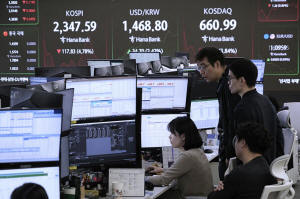World markets plunge, with Japan's Nikkei diving nearly 8%, after the
big meltdown on Wall St
[April 07, 2025] By
ELAINE KURTENBACH
BANGKOK (AP) — Shares nosedived around the world Monday as higher U.S.
tariffs and a backlash from Beijing triggered massive sell-offs.
European shares followed Asian markets lower, with Germany's DAX falling
6.5% to 19,311.29. In Paris, the CAC 40 shed 5.9% to 6,844.96, while
Britain's FTSE 100 lost 5% to 7,652.73.
U.S. futures signaled further weakness ahead. The future for the S&P 500
lost 3.4% while that for the Dow Jones Industrial Average shed 3.1%. The
future for the Nasdaq lost 5.3%.
On Friday, the worst market crisis since COVID slammed into a higher
gear as the S&P 500 plummeted 6% and the Dow plunged 5.5%. The Nasdaq
composite dropped 3.8%.
Late Sunday, Trump reiterated his resolve on tariffs. Speaking to
reporters aboard Air Force One, he said he didn’t want global markets to
fall, but also that he wasn’t concerned about the massive sell-offs,
adding, “sometimes you have to take medicine to fix something.”
Tokyo’s Nikkei 225 index lost nearly 8% shortly after the market opened
and futures trading for the benchmark was briefly suspended. It closed
down 7.8% at 31,136.58.
Among the biggest losers was Mizuho Financial Group, whose shares sank
10.6%. Mitsubishi UFJ Financial Group's stock lost 10.2% as investors
panicked over how the trade war may affect the global economy.
“The idea that there’s so much uncertainty going forward about how these
tariffs are going to play out, that’s what’s really driving this plummet
in the stock prices," said Rintaro Nishimura, an associate at the Asia
Group.

Chinese markets often don’t follow global trends, but they also tumbled.
Hong Kong’s Hang Seng dropped 13.2% to 19,828.30, while the Shanghai
Composite index lost 7.3% to 3,096.58. In Taiwan, the Taiex plummeted
9.7%.
Markets were closed Friday in China and Kenny Ng Lai-yin, a strategist
at Everbright Securities International, said the big movements might
reflect some catching up from Friday's declines.
E-commerce giant Alibaba Group Holdings fell 18% and Tencent Holdings,
another tech giant, lost 12.5%.
South Korea's Kospi lost 5.6% to 2,328.20, while Australia’s S&P/ASX 200
lost 4.2% to 7,343.30, recovering from a loss of more than 6%.
Asia is especially dependent on exports, and a large share go to the
United States.
“Beyond the market meltdown, the bigger concern is the impact and
potential crises for small and trade-dependent economies, so it’s
crucial to see whether Trump will reach deals with most countries soon,
at least partially,” said Gary Ng of Nataxis.
Oil prices also sank further, with U.S. benchmark crude down $2.03 at
$59.96 per barrel. Brent crude, the international standard, gave up
$2.03 to $63.55 a barrel.
Exchange rates also gyrated. The U.S. dollar fell to 146.24 Japanese yen
from 146.94 yen. The yen is often viewed as a safe haven in times of
turmoil. The euro rose to $1.0970 from $1.0962.
Market observers expect investors will face more wild swings in the days
and weeks to come, with a short-term resolution to the trade war
appearing unlikely.
Nathan Thooft, chief investment officer and senior portfolio manager at
Manulife Investment Management, said more countries are likely to
respond to the U.S. with retaliatory tariffs. Given the large number of
countries involved, “it will take a considerable amount of time in our
view to work through the various negotiations that are likely to
happen.”
[to top of second column] |

Currency traders watch monitors near a screen showing the Korea
Composite Stock Price Index (KOSPI), top left, and the foreign
exchange rate between U.S. dollar and South Korean won, top center,
at the foreign exchange dealing room of the KEB Hana Bank
headquarters in Seoul, South Korea, Monday, April 7, 2025. (AP
Photo/Ahn Young-joon)
 “Ultimately, our take is market
uncertainly and volatility are likely to persist for some time,” he
said.
Heavy selling kicked in after China matched President Donald Trump’s
big raise in tariffs announced last week, upping the stakes in a
trade war that could end with a recession that hurts everyone. Even
a better-than-expected report on the U.S. job market, usually the
economic highlight of each month, wasn't enough to stop the slide.
The Commerce Ministry in Beijing ordered its own 34% tariff on
imports of all U.S. products beginning April 10, among other
measures, in response to the 34% tariffs imposed by the U.S. on
imports from China.
The United States and China are the world’s two largest economies,
and a big fear is that the trade war could cause a global recession.
If it does, stock prices fall further. As of Friday, the S&P 500 was
down 17.4% from its record set in February.
Americans may feel “some pain” because of tariffs, Trump has said,
but he contends the long-term goals, including getting more
manufacturing jobs back to the United States, are worth it.
The Federal Reserve could cushion the blow of tariffs on the economy
by cutting interest rates, which can encourage companies and
households to borrow and spend. But Fed Chair Jerome Powell said
Friday that the higher tariffs could drive up expectations for
inflation and lower rates could fuel still more price increases.
Much will depend on how long Trump’s tariffs stick and how other
countries react. Some investors are holding onto hope he will lower
the tariffs after negotiating “wins” from other countries.
Stuart Kaiser, head of U.S. equity strategy at Citi, wrote in a note
to clients on Sunday that earnings estimates and stock values still
don’t reflect the full potential impact of the trade war. “There is
ample space to the downside despite the large pullback,” he said.
The Trump administration showed no signs of relenting on the tariffs
that have caused trillions of dollars in losses.
Appearing on Fox News Channel’s “Sunday Morning Futures,” White
House trade adviser Peter Navarro echoed the president when he said
investors shouldn’t panic because the administration’s approach to
trade would usher in “the biggest boom in the stock market we have
ever seen.”

“People should just sit tight, let that market find its bottom,
don’t get shook out by the panic in the media,” Navarro said.
___
Associated Press writers Ayaka McGill, Paul Harloff and Jiang Junzhe
contributed.
All contents © copyright 2025 Associated Press. All rights reserved |